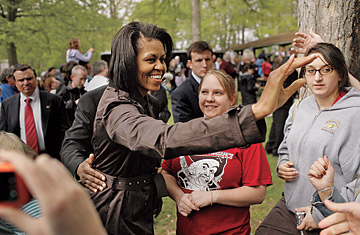
Michelle greets supporters after an Obama campaign appearance at a country picnic in Nobleville, IN.
Michelle Obama is tall, smart, funny, relaxed and basically so glowy and poised — if she's attractive in pictures, she's flat-out gorgeous in person — that it almost seems as if she already is the First Lady.
Or at least this is the conclusion I came to after sitting down with her at Denver's Westin Tabor Center during the Democratic National Convention. I'd been tagging after her for a couple of days, from one rapturous audience to another, including the crowd at a community-service event for soldiers, at which an Iraq-war veteran introduced her by announcing, "Ma'am, I know you weren't in the military, but I'd follow you anywhere." If all that hadn't quite convinced me (it was the Democratic Convention, after all), I'd guess it took roughly the first 30 seconds of our interview for me to fall for her. It happened when I asked whether she gets bored giving the same speech over and over, and she cheerfully replied, "Yeah, absolutely."
It had never been that I didn't like Michelle Obama. (Full disclosure: I voted for Hillary Clinton in Missouri's Democratic primary.) But after writing a novel about a First Lady based loosely on Laura Bush, I saw Michelle as, well, controversial. Back in June, when she made a visit to The View to talk about policy issues such as panty hose (in case you missed the episode, she's con), the appearance was widely considered part of a charm offensive intended to rehabilitate an image damaged by, among other things, the now infamous remark she'd made during a speech a few months before: "For the first time in my adult life, I am proud of my country because it feels like hope is finally making a comeback." I also knew that some people found Michelle to be variously "mean," "uppity" and "radical" — not me, mind you, but people. Plus, this very magazine had asked on its cover in June, "Will Michelle Obama Hurt Barack in November?"
To be sure, there are Americans who will never vote for Barack Obama — and by extension are unlikely to be fans of his wife — because he's black. There are also those who'll never vote for him because he's a Democrat. But are there people who would vote for him but who have been put off by Michelle?
Perhaps, but I've encountered more people who, if anything, seem more infatuated by Michelle than by her husband — including the white woman I know who bought her first-ever issue of Ebony magazine because Michelle was on the cover, and the cameraman I met in Denver who finagled a fist bump with Michelle and then proclaimed that he would never wash his hands again. He assured me he was usually jaded in these kinds of situations, but Michelle was the second coming of Jackie O.!
During our interview, I asked Michelle what accounts for the discrepancy between the admiration she inspires among such voters and the kind of blogosphere and talk-radio slurs that prompted the New Yorker, even if in jest, to run its notorious cover cartoon of her standing with her husband in the Oval Office, sporting an Afro and an AK-47. "I've realized that there are two conversations that go on," she said. "There's one at the punditry level — the polls, the writers, the folks in the know, they have one set of conversations — and then there's what's happening on the ground. Early on, I learned to base my reactions on what I see on the ground, because that to me is a more accurate reflection — even, as it turned out, in the primary. If you read the papers, you wouldn't have predicted the outcome of Iowa. But if you were in Iowa, you could feel the clear possibility of what the outcome would be."
My own theory is that the media, bolstered by conservative wishful thinking, got bored with the early Michelle Obama narrative — that she was a successful professional with a blue-collar background, degrees from Princeton and Harvard, and a penchant for making wifely jabs about her husband's morning breath — and switched to the Michelle-as-liability narrative to keep things entertaining. Certainly it seems that Michelle has paid as steep a political price for her national-pride remark, which some of us were not actually offended by, as Cindy McCain has for any of her own shortcomings.
The delicate dance that Michelle is required to perform calls to mind the axiom that blacks must be twice as good as whites to get half as far. A few Democrats — and feminists — expressed disappointment at her convention speech, with its subtext of, Ignore my race and my Ivy League education and look how warm and maternal and unthreatening I am. But others, including, presumably, Michelle herself, recognized this soft approach as a necessity.
The most poignant comment I heard her make during the days I followed her was one she shared with a group of five female newspaper columnists. As a professional black woman who grew up in a stable family and now has a stable family of her own, she told the columnists, "Sometimes I do feel as if people don't believe I exist. I'm probably the first person of my kind the nation has seen out there." Or, as Whoopi Goldberg put it during Michelle's June appearance on The View, "I have to say I'm really glad to see you because ... any time you see black folks on the news, particularly women, they have no teeth, and the teeth that they have have gold around them, and they can't put a sentence together."
